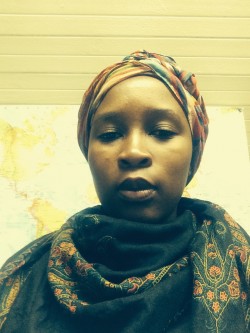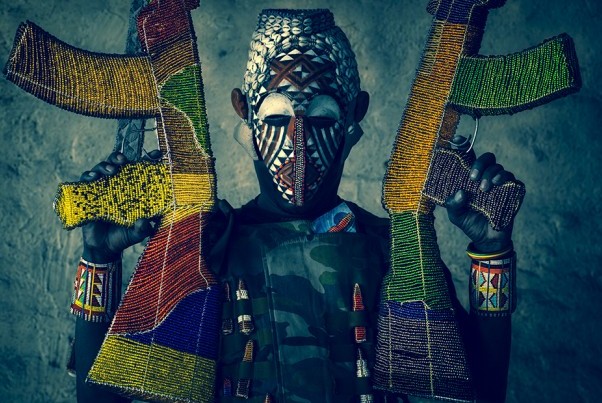I’ve seen a gun three times in my life.
*
The first time I was about six years old; in Ngqeleni, old Transkei, my grandfather’s home, my father’s home, my home.
It was a Sunday night in a candle-lit sitting room – “six-corner” as my grandmother called it, a hexagonal rondawel – as a result of non-existent electricity lines. We had just eaten plain cheese sandwiches with sweet, milky tea warmed on the paraffin heater. The steam from the boiling water had warmed the room to perfect. My cousin Sipho ate half my sandwich because we got into the habit of him eating anything I didn’t eat, to prevent me from getting into trouble. I could never deal with the consistency of cheese in my mouth.
My uncle walked in with the day’s taking from the tavern, people drank even in pitch darkness it seemed, the envelope was bulging with the coins and notes. He laid the envelope and The Gun among the trays on the table. I felt Sipho’s pulse rise but I knew better than to react. We looked ahead in the direction of the action, my face tingling with excitement and another feeling, maybe fear. When Sipho slid his hand to mine I was ready to grip it, our twin-like thinking doing its thing. We squeezed hands secretly and bottled our excitement until the last candles were blown out and all the gates had been locked. We slept in the main house, “endlini” as we all called it, with the kitchen and sitting room for visitors. When we visited our grandparents without our other cousins we had the sitting room floor to ourselves and didn’t have to share a mattress, but for that top-secret conversation we had to be close. We whispered stories to each other about our uncle’s reputation in the village and the greater Umtata, heavily spiced up of course.
“He used to be in prison but was sent away because they couldn’t handle his strength.”
“No. He was actually a warden all the prisoners feared because he was so skilled with a guns and fighting.”
“I heard Makhulu say he was a fighter in a place called Lusaka.”
“In his rondawel he hides uMratata, AK47.”
“Once he shot a man who was trying to rob the family spaza shop. The man didn’t know that Tat’omncini Mvikeli carried the gun during the day too.”
“Yes! And now the man that died is now a ghost that scares people in the village.”
We diverted quickly from the competitive storytelling once we got spooked by the ghost story. Makhulu also came to let us know that our whispering wasn’t really whispering and that children in other houses were asleep so we should sleep too before she makes us sleep outside.
“A real gun”, was the last thing I heard Sipho say before I fell asleep on his mattress.
*
The second time may or may not count. It was in my imagination on a dry winter afternoon, on a Saturday. I was watching TV with my mother while home for an indefinite ‘break’ from city life. She always picked a peculiar time to ask challenging questions that warranted answers she would not like. “Zandile’s mom came to drop off Zandile’s wedding invitation. You never speak of a boyfriend. What’s your plan? How long will you do this fashion job? Since when do you use tampons?” I thought keeping my answers short was a way to stop the questions but they never did. In my head were tales and experiences, which I had to sanitise for her gratification. In my heart I wanted to elaborate, to tell her of the smart Zimbabwean lover I met at a jazz concert and kissed during a sax solo. Or that the smart Zimbabwean lover broke my heart and every time I wanted to cry, she would call me.
It was always just a few words said while looking me in the eye then back at the TV, her arms folded and shoulders raised tensely. “Your father once pointed a gun at me. You might not remember but you were there.” Impeccable.
I imagined it right then. And later in the darkness of my bedroom. And the next day when I woke up. I imagined my mother and my father in their bedroom at the old house I barely remember. Her maybe backed up against a wall, him walking closer to her with a gun pointed at her face, me holding onto my mother’s leg probably crying or stunned silent. Thank God, I don’t remember. But how aggravating it was to have such a thought forced on my mind when I was already sick and tired of thinking of things I couldn’t figure out.
The next day I cooked my mother’s favourite meal umphokoqo – which was a horrible idea for the cold weather but I wanted to leave on somewhat harmonious terms – and told her I had booked my bus back to Johannesburg.
When I served it to her, I wondered if it was the day of the gun-pointing that halved my mother’s personality.
*
Then the night at one of Mvezi’s family’s homes in Myezo, new Mthatha. It was a warm night. Hot and humid, actually. I made him open the windows of the room; it was the size of a downtown flat. His family was real deal rich with old Transkei monies acquired in questionable ways. He was also the real deal love of my life that I’d run to from Jo’burg pressure.
“You want to play with mosquitoes?” he asked when I threw the sheet off both of us.
The bedding was a shade of blue I’ve never seen, whoever picked them had good taste.
“I’m burning up.”
“Come and see something.” He walked off naked into the passage and opened a closet.
“You’re snooping.”
“I’m not snooping, I’m showing you something. No one is here, come.”
I followed, feeling sand particles under my feet.
“Have you ever seen one of these?” He stroked The Gun.
“Seriously, Mvezi.”
“Come on. It’s fine.”
“I’ve seen one. Put it away.”
“It’s such a good weight. Feel it. “
“Mvezi. Come back to bed.”
“Don’t you wanna feel it? It’s on safety. Feel it, it’s nice and cool.” He always had a glint in his eyes that could make one feel like they were missing out.
“I’m just gonna feel its weight.”
“That’s fine, then I’ll put it away.”
I moved closer to him. He handed it to me slowly, I had braced my arms.
“It feels cold.”
“Let me put it on your back.”
“Seriously, Mvezi.”
But I turned around.
He pressed it on my back on its side and pulled me close with one hand on my belly.
“Okay, we’re done,” I said for the sake of protest.
He turned me around.
“Where else are you hot?”
I touched my chest. He moved the gun to my chest, never breaking his gaze into my eyes, the glint still taunting me.
“And here.” I touched my belly.
He moved it lower.
“Let’s go back to bed, “ I said, almost serious.
He traced my lips with the nozzle, his hand now trembling, his other hand holding my arm tightly.
“Do you know that I love you?”
“I’m not sure.” Meaning it.
“Ndiyakuthanda, ke,” he said for the first time.
Plainly, sweetly, with a gun to my lips. He put the gun away and pulled me back to bed.
**********************
Post image by Ralph Ziman via africandigitalarts. The image is part of an art project titled “Ghost.”
About the Author:
 Chumisa lives in the bizarre and tormented city of Cape Town. Because of this she tries to write everyday.
Chumisa lives in the bizarre and tormented city of Cape Town. Because of this she tries to write everyday.









stan April 29, 2015 14:45
It is such a lovely story.